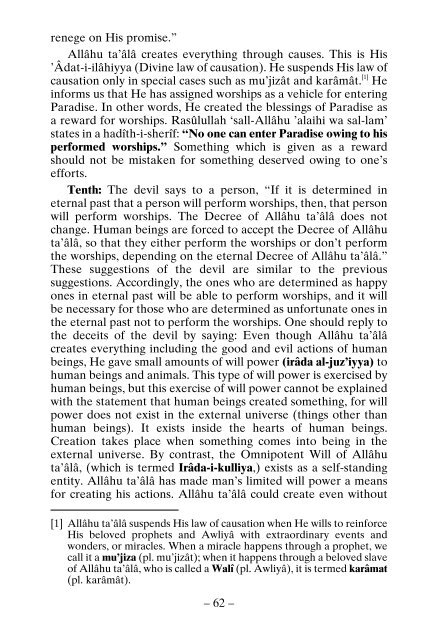Ethics of Islam
Ethics of Islam is taken from the book Berîka by Muhammad Hâdimi. Immorality and ways to get rid of it; 40 depravities and cures to them; usefulness of ethics; what is a soul; strengths of a soul; Personalities emanating from wisdom, courage, chastity and justice are extensively explained.
Ethics of Islam is taken from the book Berîka by Muhammad Hâdimi. Immorality and ways to get rid of it; 40 depravities and cures to them; usefulness of ethics; what is a soul; strengths of a soul; Personalities emanating from wisdom, courage, chastity and justice are extensively explained.
You also want an ePaper? Increase the reach of your titles
YUMPU automatically turns print PDFs into web optimized ePapers that Google loves.
enege on His promise.”<br />
Allâhu ta’âlâ creates everything through causes. This is His<br />
’Âdat-i-ilâhiyya (Divine law <strong>of</strong> causation). He suspends His law <strong>of</strong><br />
causation only in special cases such as mu’jizât and karâmât. [1] He<br />
informs us that He has assigned worships as a vehicle for entering<br />
Paradise. In other words, He created the blessings <strong>of</strong> Paradise as<br />
a reward for worships. Rasûlullah ‘sall-Allâhu ’alaihi wa sal-lam’<br />
states in a hadîth-i-sherîf: “No one can enter Paradise owing to his<br />
performed worships.” Something which is given as a reward<br />
should not be mistaken for something deserved owing to one’s<br />
efforts.<br />
Tenth: The devil says to a person, “If it is determined in<br />
eternal past that a person will perform worships, then, that person<br />
will perform worships. The Decree <strong>of</strong> Allâhu ta’âlâ does not<br />
change. Human beings are forced to accept the Decree <strong>of</strong> Allâhu<br />
ta’âlâ, so that they either perform the worships or don’t perform<br />
the worships, depending on the eternal Decree <strong>of</strong> Allâhu ta’âlâ.”<br />
These suggestions <strong>of</strong> the devil are similar to the previous<br />
suggestions. Accordingly, the ones who are determined as happy<br />
ones in eternal past will be able to perform worships, and it will<br />
be necessary for those who are determined as unfortunate ones in<br />
the eternal past not to perform the worships. One should reply to<br />
the deceits <strong>of</strong> the devil by saying: Even though Allâhu ta’âlâ<br />
creates everything including the good and evil actions <strong>of</strong> human<br />
beings, He gave small amounts <strong>of</strong> will power (irâda al-juz’iyya) to<br />
human beings and animals. This type <strong>of</strong> will power is exercised by<br />
human beings, but this exercise <strong>of</strong> will power cannot be explained<br />
with the statement that human beings created something, for will<br />
power does not exist in the external universe (things other than<br />
human beings). It exists inside the hearts <strong>of</strong> human beings.<br />
Creation takes place when something comes into being in the<br />
external universe. By contrast, the Omnipotent Will <strong>of</strong> Allâhu<br />
ta’âlâ, (which is termed Irâda-i-kulliya,) exists as a self-standing<br />
entity. Allâhu ta’âlâ has made man’s limited will power a means<br />
for creating his actions. Allâhu ta’âlâ could create even without<br />
[1] Allâhu ta’âlâ suspends His law <strong>of</strong> causation when He wills to reinforce<br />
His beloved prophets and Awliyâ with extraordinary events and<br />
wonders, or miracles. When a miracle happens through a prophet, we<br />
call it a mu’jiza (pl. mu’jizât); when it happens through a beloved slave<br />
<strong>of</strong> Allâhu ta’âlâ, who is called a Walî (pl. Awliyâ), it is termed karâmat<br />
(pl. karâmât).<br />
– 62 –

















